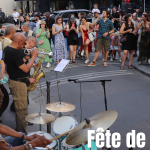You sit on the splintered wooden picnic table and nurse a pint of blonde. You look at the canal Saint-Martin and you squint in the afternoon sun on the water and the white sand of Paris Plages. You feel at peace and solid and a part of the crowd around you that murmurs in endless du coup and en fait and genre. Music plays somewhere. And you think that the afternoon is perfect but would be a little better if the grass wasn’t so damn yellow and dry.
You don’t know that three weeks before, a crowd of tents huddled there by the canal sheltered by the Pont de la Rue Louis Blanc. But how could you? You don’t know that one day a representative of la Mairie du Xe walked down from that street above and reported the group of refugees as an anomaly to her superiors. Well, space needed to be made for a half dozen picnic tables. And you do need to sip your pint among your little murmuring community. But how could you know about their community? They were fleeing famine, persecution and war and they found themselves in an unfamiliar country in the humble company of others who flee. They pitched their tents next to each other because in that congregation they found security and stability and comfort. In a sea of bright waterproof polyester they lived for several weeks before a representative of la Mairie du Xe told them that picnic tables were needed and they were not.
We celebrate the sun and the peace of summer together. But who is “together,” who is invited? And whose tents are taken down, unstaked and folded away with no promise of enduring community? Who sets up the picnic tables that take their place? Who sits at them and drinks blondes?
Sometimes brazen irony reaches the point of being outrageous.
“Une nation dans laquelle une classe est opprimée ressemble à un homme qui a une blessure à la jambe : la jambe malade interdit tout exercice à la jambe saine.”
– Louis Blanc



